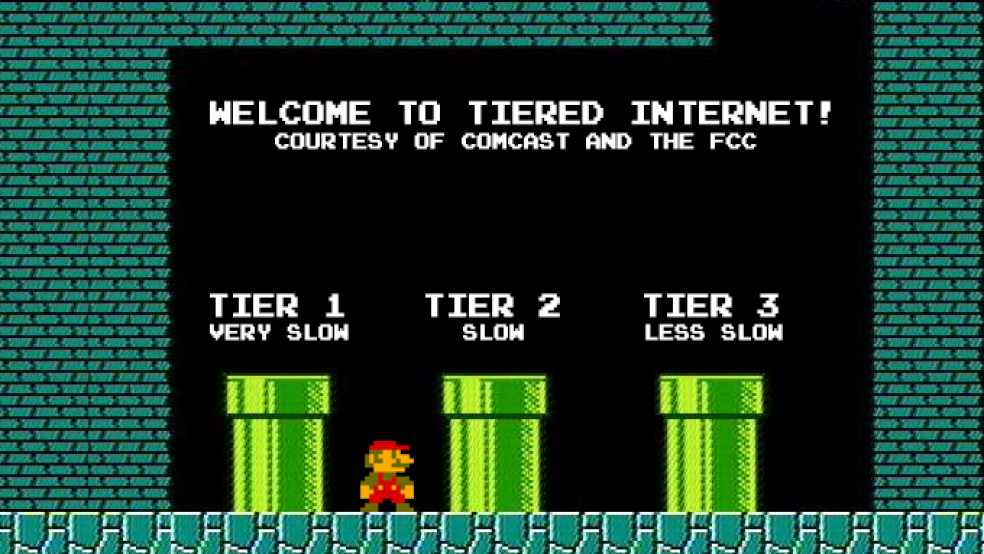Not far into Trump’s term as president, you may find yourself paying more to your Internet service provider when you curl up on a Saturday night to binge-watch your favorite series on Netflix, Amazon Prime or one of the other OTT providers.
Related: Net Neutrality Gets a Big Win in Court
That’s because the Federal Communications Commission under President Donald Trump is likely to try changing the current approach to the internet by scrapping so-called Net Neutrality rules only recently reviewed and confirmed by the U.S. Court of Appeals.
Net Neutrality means that internet service providers must not discriminate among what flows through their “pipes” by blocking certain types of content, slowing load times or, most important to consumers, charging more for the delivery of content that chews up bandwidth – like a movie or video series. As The Fiscal Times has explained:
“Net neutrality is, at its core, the concept that every piece of information on the public internet should be as accessible as any other. More specifically, it means that the access to this information should not be in any way stifled by your internet service provider (ISP). …Net neutrality advocates insist that a free and open internet, and a level playing field for companies large and small, is key to the growth and success of the internet and to the emergence of new businesses like Facebook or Twitter or Amazon or BuzzFeed, or any other startup that relies on internet traffic. And they worry that, if allowed, broadband providers would crush any new site or service that could threaten their existing or future businesses, potentially choking off services like Netflix to steer users to their own versions.”
Related: The Net Neutrality Debate Explained
On one side of the divide are companies such as Netflix and Twitter; on the other are service providers such as Verizon and AT&T. Last July, AT&T was among the companies joining telecom trade groups in petitioning the U.S. Court of Appeals in Washington to reconsider a landmark ruling handed down the previous month that essentially blessed Obama FCC rules that treat the internet as if it is a public utility, subject to regulation, instead of a digital marketplace.
At the time, FCC Chairman Tom Wheeler called the ruling "a victory for consumers and innovators who deserve unfettered access to the entire web, and it ensures the internet remains a platform for unparalleled innovation, free expression and economic growth."
But a Republican member of the five-person commission, Michael O'Reilly, warned, "We all will rue the day the commission was confirmed to have nearly unmitigated power over the internet."
Now within the first months of the Trump administration, O’Reilly may find his approach – and that of the ISPs – has become the dominant one. President Trump will have the opportunity to appoint new commissioners, and as the news website Mic is reporting, strong voices on the Trump “landing team” for the FCC are outspoken opponents of Net Neutrality.
Related: U.S. FCC approves new broadband service privacy rules
One, Jeffrey Eisenach, director of the Center for Internet, Communications and Technology Policy at the conservative American Enterprise Institute and a former Federal Trade Commissioner, wrote in a New York Times op-ed in late October: “The internet is not a monopoly. Wireline and wireless carriers compete – and innovate – at a furious pace.
Utilities, on the other hand, operate where it makes sense to have just one provider because the costs of operating a second one are too high to justify the exercise. We regulate public utilities because they are, by definition, monopolies – but the costs of regulation are high. Rather than business decisions being made in the marketplace, they are contrived by politicians and bureaucrats who are, in turn, influenced by the lobbying campaigns not just of the utilities but of everyone with a stake – customers, suppliers and labor unions all get involved.”
An attempt to contact Eisenach was unsuccessful.
In a speech before the Free State Foundation on Dec. 7, Republican FCC Commissioner Ajit Pai said that he believes his prediction about the Net Neutrality rule – that “its days are numbered” – will soon come true.





